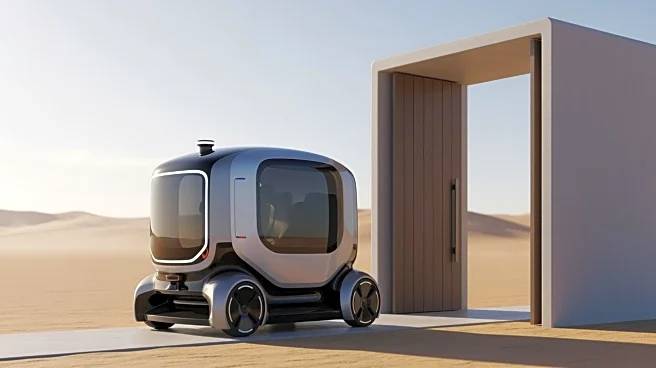What's Happening?
Waymo, a subsidiary of Alphabet, has partnered with DoorDash to incorporate its autonomous vehicles into DoorDash's delivery operations in Phoenix, Arizona. This collaboration enables DoorDash customers to choose autonomous delivery options using Waymo's
driverless Jaguar SUVs for orders placed through DashMart, DoorDash's convenience and grocery store platform. Customers can access their orders by unlocking the vehicle's trunk via the DoorDash app. This initiative is part of DoorDash's strategy to reduce costs associated with human delivery drivers by utilizing autonomous technology, following a similar program previously conducted with Uber Eats.
Why It's Important?
The partnership between Waymo and DoorDash marks a significant step in the integration of autonomous technology into everyday business operations. By leveraging self-driving vehicles, DoorDash aims to streamline its delivery process, potentially reducing operational costs and increasing efficiency. This move could set a precedent for other delivery services to adopt similar technologies, impacting the logistics and transportation industries. Additionally, it highlights the growing trend of automation in service sectors, which could lead to shifts in employment patterns and require new regulatory frameworks to address safety and operational standards.
What's Next?
As Waymo and DoorDash roll out this autonomous delivery service, they may face challenges related to public acceptance and regulatory compliance. Stakeholders, including local government and consumer advocacy groups, will likely monitor the program's impact on traffic safety and job displacement. Future expansions of this service could depend on the success of the Phoenix initiative, potentially leading to broader adoption in other cities. Continuous advancements in autonomous vehicle technology will be crucial in overcoming technical and logistical hurdles, paving the way for more widespread use in various sectors.
Beyond the Headlines
The collaboration between Waymo and DoorDash could influence the cultural perception of autonomous vehicles, shifting public opinion towards acceptance of driverless technology in everyday life. Ethical considerations regarding job displacement and the environmental impact of increased vehicle automation may arise, prompting discussions on sustainable practices and workforce retraining. Long-term, this development could contribute to a shift in urban planning, with cities adapting infrastructure to accommodate autonomous vehicles.















